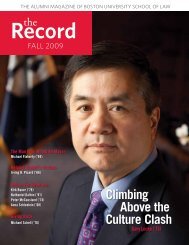the nature of representation: the cherokee right ... - Boston University
the nature of representation: the cherokee right ... - Boston University
the nature of representation: the cherokee right ... - Boston University
You also want an ePaper? Increase the reach of your titles
YUMPU automatically turns print PDFs into web optimized ePapers that Google loves.
104 PUBLIC INTEREST LAW JOURNAL [Vol. 15<br />
Cherokees had advanced generally “two propositions—<strong>the</strong> one for a partial cession,<br />
and to be secured in <strong>the</strong> residue, <strong>the</strong> o<strong>the</strong>r . . . to sell <strong>the</strong> whole country for a gross<br />
sum <strong>of</strong> money.” 71<br />
The first negotiation position that Ross took, o<strong>the</strong>r than a blanket denial <strong>of</strong> <strong>the</strong><br />
<strong>right</strong> <strong>of</strong> <strong>the</strong> U.S. to remove <strong>the</strong> Cherokees or calls for <strong>the</strong> U.S. to first live up to<br />
prior treaties, was to float <strong>the</strong> idea <strong>of</strong> partial land concessions. Ross hoped that by<br />
giving up “an extensive portion <strong>of</strong> <strong>the</strong>ir territory,” <strong>the</strong> U.S. government would<br />
“guarantee <strong>the</strong> fee-simple <strong>right</strong> <strong>of</strong> <strong>the</strong> property in <strong>the</strong> soil to <strong>the</strong> Cherokees in <strong>the</strong><br />
lands thus reserved.” 72<br />
In effect, Ross was proposing, under <strong>the</strong> force <strong>of</strong> necessity,<br />
to give up additional land so that <strong>the</strong> U.S. government would live up to its<br />
responsibility to safeguard Cherokee <strong>right</strong>s. 73 The possibility that <strong>the</strong> U.S. would<br />
conclude a removal treaty with <strong>the</strong> Cherokee minority faction spurred Ross to<br />
provide a concrete selling price for eastern Cherokee lands. Ross’s silence<br />
regarding specific treaty provisions can be explained partially by <strong>the</strong> difficulty he<br />
had “uncover[ing] details <strong>of</strong> <strong>the</strong> treaty being worked out between Jackson and <strong>the</strong><br />
dissidents.” 74 Though he did not know <strong>the</strong> details, he did know <strong>the</strong> minority<br />
faction was negotiating with <strong>the</strong> U.S. government supposedly on behalf <strong>of</strong> all<br />
Cherokees. Ross’s biographer, Gary Moulton, explained, “Because a rival<br />
delegation led by John Ridge and Elias Boudinot was also present in Washington,<br />
Ross and his colleagues were driven to desperation.” 75<br />
In February 1835, Ross<br />
<strong>of</strong>fered complete “cession <strong>of</strong> [Cherokee] Territory [for] <strong>the</strong> gross sum <strong>of</strong> Twenty<br />
Millions <strong>of</strong> Dollars.” 76 The same letter concerning <strong>the</strong> $20 million explained that<br />
<strong>the</strong> <strong>of</strong>fer was being made only out <strong>of</strong> duress and would not ordinarily be made:<br />
We need not assure you, for <strong>the</strong> fact cannot be doubted—That, were <strong>the</strong><br />
protection <strong>of</strong> <strong>the</strong> [United States Government] fully extended to <strong>the</strong>m . . . no<br />
amount <strong>of</strong> money far above <strong>the</strong> sum proposed can be <strong>of</strong>fered which could<br />
induce <strong>the</strong> Cherokee people voluntarily ever to yield <strong>the</strong>ir assent to a cession<br />
71<br />
Memorial from <strong>the</strong> Cherokee Delegation Headed by John Ross to <strong>the</strong> U.S. Senate<br />
(Mar. 8, 1836), in 1THE PAPERS OF CHIEF JOHN ROSS, supra note 14, at 397.<br />
72<br />
Letter from John Ross, Daniel McCoy, R. Taylor, Samuel Gunter, and William<br />
Rogers to Lewis Cass (Feb. 14, 1835), in 1THE PAPERS OF CHIEF JOHN ROSS, supra note<br />
14, at 322.<br />
73<br />
Prior to this letter, <strong>the</strong> SupremeCourtacknowledged U.S. responsibility to protect<br />
Cherokee land <strong>right</strong>s against state encroachment. Worcesterv. Georgia, 31 U.S. (6 Pet.)<br />
515 (1832).<br />
74<br />
NORGREN, supra note 40, at 134.<br />
75<br />
MOULTON, supra note 23, at 60.<br />
76<br />
Letter from John Ross, R. Taylor, Daniel McCoy, Samuel Gunter, and William<br />
Rogers to Lewis Cass (Feb. 25, 1835), in 1THE PAPERS OF CHIEF JOHN ROSS, supra note<br />
14, at 325. An interesting aside in <strong>the</strong> larger story <strong>of</strong> removalis <strong>the</strong> possibility, which<br />
Ross explored briefly, <strong>of</strong> <strong>the</strong> Cherokees using <strong>the</strong> settlement money to establish a new<br />
Cherokee “Colony” in Mexico. LetterfromJohnRoss to FriedrichLudwig Von Roenne<br />
(Mar. 5, 1835), in 1THE PAPERS OF CHIEF JOHN ROSS, supra note 14, at 330.









